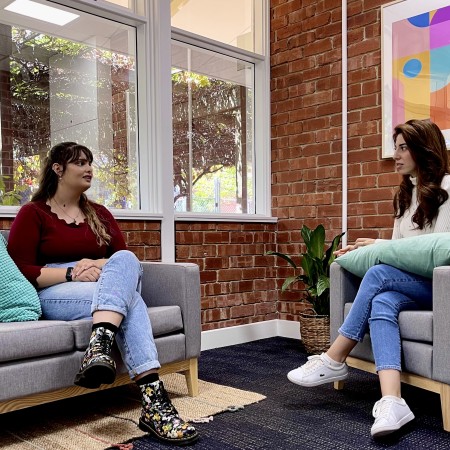headspace
Marion
-
233 Sturt Road, Kaurna Country, Marion, South Australia 5043
-
Phone (08) 8490 7700
-
Fax (08) 8490 7799
-
info@headspacemarion.org.au
-
About
Welcome! Marni Niina Pudni
At headspace Marion we're here for you. We provide free and confidential support where young people aged between 12 and 25 can access qualified youth mental health professionals.
Our services cover four core areas: mental health and wellbeing, physical and sexual health, work and study support, and alcohol and other drug services.
headspace can help if you:
- are feeling down, stressed or worried a lot of the time
- want to talk about relationships
- want to talk about sexuality or gender identity
- are having difficulty with family or friends
- need support with work and study
- are impacted by alcohol and other drugs
- need to see a youth-friendly GP for mental health concerns
You can self-refer or refer a young person who is going through a tough time via our online form below.
Looking for parking, transport, and accessibility information?
Want a centre tour with one of our friendly volunteers?
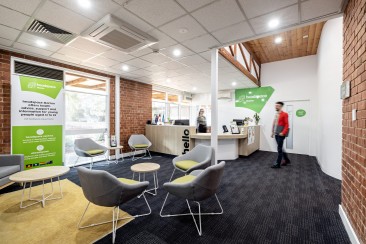
Hours
- Monday: 9:00am - 5:00pm
- Tuesday: 9:00am - 7:00pm
- Wednesday: 9:00am - 5:00pm
- Thursday: 9:00am - 7:00pm
- Friday: 9:00am - 5:00pm
- Saturday: Closed
- Sunday: Closed
headspace Marion is operated by Sonder. All headspace services are funded by the Australian Government Department of Health and Aged Care. Administration of funding is carried out by the headspace centre’s local Primary Health Network, in this case, Adelaide PHN.
Services
If you live near our headspace centre in a rural area but cannot travel in to see us, you can see our mental health workers online.
GPs can help with any physical health issues as well as issues related to sexual health, drug or alcohol use, relationship problems or feeling down or upset. Your centre may have a GP on site or links to one locally.
Workers either on site or linked to the centre who can assist you with work or study opportunities.
Centres have a range of programs and activities for young people. Just ask your centre what they have on.
Mental health workers – which may include psychologists, psychiatrists, counsellors and other workers – that can help if you're just not feeling yourself.
Workers either on site or linked to the centre who can assist you with any alcohol or other drug concern.
A group of young people who help with events and some decision making at a centre. Ask your centre about getting involved.
News
Media gallery
More information

Welcome! Marni Ninna Pudni
headspace Marion is located on Kaurna Country, within the City of Marion council building district at 233 Sturt Road, Marion.
We have compiled this downloadable 'where to find us' factsheet that includes information around parking, building accessibility, buses and trains.
Our full range of Welcome Pack documents can be downloaded from the list below:
Your online resources and our online resources booklet
You will also be provided with hard copies of the above documents at your first visit to the centre.
If you are a family member or friend supporting a young person at headspace Marion, we have created this Family and Friends Welcome Pack booklet for you to download. You can also request a hard copy of this at the centre.
What to expect at a headspace centre
Accessibility
The headpace Marion centre has been designed and developed by young people to ensure it is a welcoming space - you can listen to music, charge your phone, request a hot/cold drink or a snack and chill out before your appointment.
For parking, enter via Sturt Road or Diagonal Roads and follow the headspace signs. we have accessible parking spaces and a car park access ramps at the rear of the building. Enter via Diagonal Road, Cooinda Neighbourhood Centre entrance. Our main entrance door is automatic and our furniture is spaced with wheelchairs in mind. If you have any questions about our centre's accessibility, please give us a call on (08) 8490 7700.
What if English is my second language?
Our services are provided in English. In some cases interpreters can be arranged in advance to support you or your family and friends to communicate with a headspace worker during a session.
For more information, please speak to one of our headspace team members or visit Embrace Multicultural Mental Health embracementalhealth.org.au
headspace has a range of factsheets available in other languages that can be found here.
Peer Support Workers
headspace Marion has Peer Support Workers available for young people to work with at the centre. Peer support provides an opportunity for young people to connect with others who have experienced similar challenges. Peer Support Workers listen and provide support in a non-judgemental manner to help young people navigate life’s challenges.
Peer support is a mutual relationship, but is also more than sharing lived experience: peer workers bring life, communication, and empathy skills to the work they do. Discussions with Peer Support Workers can focus on challenges or goals relating to relationships, school, university, work, managing symptoms, general health and alcohol and other drugs.
Our Peer Support Workers facilitate some of our groups, but may also arrange to see you one-on-one.
What to expect at your appointment?
Your first visit may be in person, or on the phone.
At the first visit you will:
- Check in at the front counter and provide our staff with any extra registration information that may need.
- If one have been booked in, you will have your personalised ‘meet and greet’ session with one of our Youth Ambassador volunteers.
- You will be asked to complete our hAPI survey, this is brief and forms a part of a series of surveys that you complete each time you visit the centre.
- Talk to a headspace worker
- Be given an opportunity to:
- Share what’s been impacting your wellbeing
- Talk together about what goals you might want to work on
If you feel comfortable, family members are encouraged to attend your appointment with you.
After the first visit
If you choose to continue at headspace Marion, together we might work on goals you’ve identified as important to you. We would work together to plan the next steps which may include: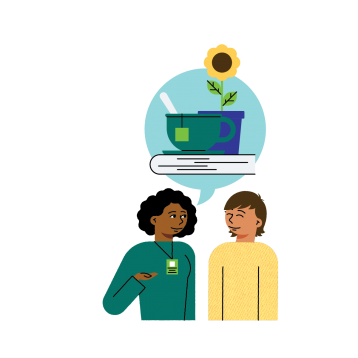
> Access to a doctor for physical or mental health difficulties
> Study or vocational assistance with a work and study specialist
> Sexual health information and support
> Alcohol and other drug assistance from an Alcohol and other Drug Support Worker
> Referral to other agencies best suited to you and your family’s needs. If you need a referral from a doctor to access a particular service, we can arrange this
> Mental health support, such as cognitive behavioural therapy (CBT), problem solving, supportive counselling and group sessions.
> Access to one of our Peer Support Workers and/or sessions though our Brief Interventions Clinic.
How long will an appointment take?
Appointments usually take around 45-50 minutes, sometimes a little longer for the first time you visit us. We advise that your arrive around 15 minutes prior to your booked appointment time to allow you to settle in, complete your regular hAPI survey and any other check-in requirements at the time.
If you have been booked for a ‘meet and greet’ appointment with one of our Youth Ambassadors, these are booked in for 30 minutes prior to your appointment with your clinician. You will be advised what time to arrive at the centre at the time of booking your ‘meet and greet’.
You can confirm the length of your appointment by calling the centre on (08) 8490 7799.
How much will an appointment cost?
Services at headspace are offered for free, with no gaps to pay.
You may need a Medicare card to access some of our services, depending on the clinician you have been allocated to. We can help you work out how to apply for a Medicare card or access your Medicare details.
We may recommend you see a doctor to get a Mental Health Care Plan (MHCP). To work out what this might mean for you, talk with one of our headspace team members.
Join our community
Our safe and supportive online community provides a great way to connect with others, and share resources that are helpful to you.
Out regular group chats bring young people together and explore topics that are important to the community. Our peer-led chats are held four nights a week, where you can share tips and experiences with others. There are also chats run by our professional clinicians who explore topics and provide resources, strategies and advice to help build your skills.
You can also create your own personal space on Online Communities where you can curate your own personalised content, and have one space to keep all of the information, tips and advice that’s relevant to you.
headspace Sessions Podcast
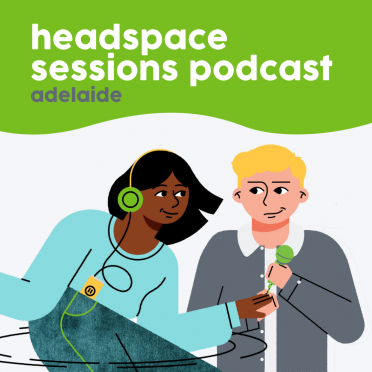
Our headspace Sessions Podcast is about all things mental health. Each episode features topical content that is handpicked by the young creative team as well as special guests, experts and practical advice delivered in an educational, engaging and inspirational format.
Recorded right here in South Australia at the headspace Adelaide podcast and PodBooth studios.
Visit our Soundcloud profile or search for us on any of your preferred podcast platforms such as Spotify and Apple Podcasts.
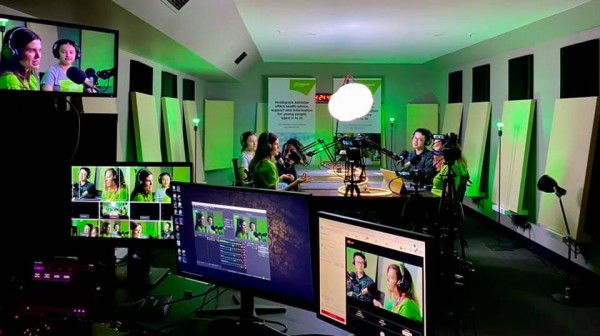
Our crisis services card:
Everyone is welcome at headspace Marion.
The general mental health program offers short-term services for young people experiencing mild to moderate difficulties. There is no cost to access our services.
Anyone can make a referral on behalf of a young person including a friend or family member, health worker or community agency, or a doctor. It is important to note that attendance with the general mental health program is on a voluntary basis, if you are making a referral on a young person’s behalf we encourage you to speak with them prior to making a referral.
Please note that depending on the support required, headspace Marion may recommend or need to provide a referral to other agencies best suited to the situation. We will support the young person and/or the referrer whenever this is the case.
Medicare information
First: what is Medicare?
Medicare is Australia’s public health system. It gives people cheaper (and often free!) doctor’s visits, in person and via telehealth, medicines, and lets you go to public hospitals as a public patient. It also provides up to 10 sessions each year with a mental health professional if you get a mental health treatment plan referral from your GP.
If a Mental Health Care Plan (MHCP) referral is arranged through a local doctor, a Medicare card will be required. This is so that Medicare will cover some or all of the cost of care planning provided by the local doctor. The doctor should outline what costs (if any) are involved when a MHCP is arranged. Services provided at headspace Marion via a MHCP are bulk-billed, with no gap to pay. Our team will provide a reminder to bring the Medicare card when an appointment is booked in with a service through a MHCP.
What is bulk-billing?
Bulk billing is when your doctor lets you use your Medicare card to cover the cost of your appointment, so you don’t have to pay for anything. Keep in mind not all doctors bulk bill, so if that’s the case they’ll charge you directly and you’ll get money back from Medicare later. You can find a list of doctors and clinics that bulk bill in Australia.
What is a gap?
If Medicare doesn’t cover all of the cost of your appointment, this is the amount that’s left that you must pay. It’s good to ask if you’ll have to pay a gap when you book your appointment, so you know what to expect.
Why should I get a Medicare card?
There are a bunch of advantages to getting your own Medicare card:
- You’ll be able to get support for your own wellbeing – like going to a psychologist or getting a sexual health check up – with less worry about who can see that you've had the appointment.
- You’ll get a sense of independence having a card of your own.
- The government only issues up to three copies of the one card, so if there are four or more people in your family, getting your own card will be more convenient.
- A Medicare card can also count as ID evidence for all sorts of things, like applying for a passport.
How do I get my own Medicare card?
It’s pretty simple to get your Medicare card. Just follow these steps:
- Complete a Medicare enrolment form.
- Send your completed form and supporting documents to Services Australia via post (address is on the form) or via email. Supporting documents could include copies of your birth certificate, driver’s licence, learner’s permit or passport as well as residency documents such as lease agreements and evidence of employment.
- Wait for Services Australia to mail you your card. You can also download the Express Plus Medicare mobile app to access a digital copy of your Medicare card.
If you’re already on your family’s Medicare card and want your own, it is even easier.
You can do this online through your Medicare online account (this is linked through your myGov account), or the Express Plus Medicare mobile app Services Australia has put together a helpful step-by-step guide on how to request a new card.
What if I'm Aboriginal or Torres Strait Islander and don't have standard identity documents?
No worries, you can still get a Medicare card by using a referee instead. You and your referee will need to fill in the Aboriginal and Torres Strait Islander Medicare enrolment and amendment form. Then take your form to your local agent, access point or service centre. If you need help, you can call the Indigenous Access Line.
Who can be a referee?
A community elder, medical/health service manager, nurse, school principal, any permanent Commonwealth employee with 5 or more years of continuous service, council chairperson, minister of religion and a welfare organisation worker.
If you don’t have one already, it’s also worth checking if you’re eligible for a healthcare card or low-income healthcare card. These cards are for anyone who earns under a certain amount or is on a Centrelink benefit. They count as concession for things like public transport and mean the government will pay more of your health services.
What if I'm a culturally diverse young person who has recently moved from overseas and don't have a Medicare card?
You are able to access our general mental health program for free and without a Medicare card. This program enables you to 10 free sessions with a qualified mental health professional at our centre.
To access a private psychologist at headspace, this requires a Mental Health Care Plan, and thus, a Medicare card.
In response to COVID-19: If you are experiencing cold/flu like symptoms, or currently testing for COVID-19, or currently in isolation - we may be able to offer a telehealth appointment during lockdown and stay at home directives.
download our telehealth factsheet
What is telehealth?
Telehealth allows you to talk to a headspace clinician, privately through a phone or video call rather than seeing them in person. The headspace clinician will listen and help you with strategies to get through tough times. You will be able to see, hear and talk to your clinician, exactly as if you were talking to them in person.
headspace uses systems that meet recommended standards to protect the privacy and security of Telehealth appointments and are in accordance with the Australian Privacy Act and Australian Privacy Principles.
Why is headspace offering Telehealth?
We’ve taken this step to ensure the safety of young people, their family and friends, and staff working in our headspace Centres due to COVID-19.
How does an appointment via Telehealth work?
A telehealth appointment is just like a normal appointment; only you will be seeing and speaking to your clinician on a phone or computer/smartphone screen. Your worker will already have relevant information about you to support your telehealth session.
If you are unsure about using telehealth you can also have a family member, carer or friend with you if you wish with the consent of your clinician. You will sit in front of a computer or smart device and you'll be able to see yourself and your clinician on our Telehealth platform screen.
At the time of your video Telehealth session, your device will ring and the connection is made with your clinician and the sessions begins. The clinician will speak with you about your needs the same as if you were in the face-to-face consultation.
What equipment do I need for my appointment?
You’ll need a laptop, tablet or mobile and internet connection for online video appointments. If you prefer chatting over the phone, then just a mobile or landline is required. It’s a good idea to test your equipment 15 minutes prior to your appointment to prevent any delays.
Please ensure your device is plugged in or at least has enough charge for the duration of the required appointment.
It is important for you to use a secure internet connection rather than public/free Wi-Fi. This will provide greater security reducing the risk of unauthorized access to your session
What is required of me?
- You will need to inform us of your location (address) at the start of each telehealth session.
- You will need to inform us if anyone else if as home (we will record this on your file so we can contact someone else at your home in an emergency).
- Try to ensure any interruptions are minimised. Where possible, you will need to be in a quiet and private room. If you can’t find a space inside, maybe try your backyard. If you’re comfortable, let your family know you are on a call and ask for some space. If this feels too much, please let your clinician know so that they can support you to figure out how best to manage this. Please inform your clinician if the privacy or confidentiality of the room is compromised/breached at any stage of the appointment.
- Other devices which could interrupt the telehealth session should be muted/switched off.
- You are not permitted to record the Telehealth appointment without advance written permission of headspace.
- It is important to be on time for your Telehealth appointment. If you need to cancel or change your appointment, you must notify us in advance by phone.
- During video Telehealth appointments, look at the video camera on your monitor/smart device so you have good eye contact with your clinician.
- Speak clearly so your voice can be picked up by the microphone.
- If you have a question or want more information during the appointment, just ask your clinician.
- If you are not an adult, we need the permission of your parent or legal guardian (and their contact information) for you to participate in Telehealth appointments.
What will happen if the audio/video technology fails?
There may be delays or lags in video Telehealth on occasions due to failures of the video platform and internet connection.
When we commence Telehealth appointments, we will develop a Safety Plan with you. This plan includes a phone number where you can be reached. We need this information to restart the session or to reschedule it, in the event of technical problems.
Your Safety Plan will include at least one emergency contact and crisis supports for you, in the event of a crisis situation.
If the video Telehealth connection drops out, your Worker will contact you on your personal phone number to continue the session.
If you do not answer, we will contact your nominated parent/guardian/support person via phone as a safety measure.
If we have serious concerns for your welfare, we will consider whether we need to involve emergency or crisis services to check in and support you.
What are the benefits of a Telehealth appointment?
Telehealth appointments allow for a reduced waiting time to see our service. It also means you don't have to travel to our service and can engage in physical distancing and stay at home, self-isolating. Telehealth assists us to better look after you ‘remotely’ in what we realise can be a difficult time for many.
What are the risks of a Telehealth appointment?
A phone or video consultation may not be exactly the same, and may not be as complete as a face-to-face service. You could also run into some technical problems that affect phone/video sessions on occasions. headspace uses systems that meet recommended standards to protect the privacy and security of Telehealth visits and are in accordance with the Australian Privacy Act and Australian Privacy Principles. Any internet based service carries an inherent risk from unauthorised access. The security measures in place mitigate this risk, but it does exist.
What costs are involved?
Calls via phone will be free unless we inform you otherwise. A typical ‘data’ cost to you for a video Telehealth session will be approximately 1 GB per 60 minutes.
Please ensure you have enough data on your device or desktop for a video Telehealth based session to be conducted for the duration of the required appointment. If this will cause difficulties for you please let your worker know.
If you do not have enough data for a video Telehealth session, will be provided with the option of a phone based appointment or a face to face appointment.
Telehealth sounds strange, what if I'm not comfortable with it?
For some people, it can be strange at first, however your Worker will help you feel comfortable and become familiar with the process. Phone and video services can be a positive experience, as people may feel less self-conscious. If you’re not comfortable, let your clinician know. Once they understand your challenges they’re much better placed to address them and support you to access sessions in a way that works for you. This could include a follow up face-to-face visit, a Telephone appointment (without video) or trying a second video Telehealth visit after some problem solving or adjustments to suit you.
You may change your mind and stop using Telehealth appointments at any time. This will not make any difference to your right to ask for and receive alternative health care services from headspace.
What about confidentiality and privacy?
We will not record or store Telehealth appointments.
Your rights to confidentiality and privacy will always respected. headspace will not disclose your private information unless we have your consent to do so, or are authorised or required to by law.
If we have concerns there is a risk to the safety of you or others, we will need to act on this, and this may involves sharing your details with others.
Please refer to the Privacy Collection Notice and Privacy Policy on our website for more details.
If you have any concerns about our policies and procedures relating to Telehealth or would like to lodge a complaint or concern you may do so at any stage by contacting us at headspace Adelaide on 1800 063 267 or info@headspacemarion.org.au
If you have any questions or concerns about using Telehealth, please contact us at headspace Marion on (08) 8490 7700 or info@headspacemarion.org.au
Please note
The latest medical information is changing on a daily basis. If you suspect you are at risk, or would simply like to understand COVID-19 more, please visit the Department of Health’s website health.gov.au
When should I get help?
If you ever feel unable to cope because of overwhelming or intense emotions, or if you have any thoughts of harming yourself, then ask for help immediately.
National 24/7 crisis services
Lifeline: 13 11 14 or lifeline.org.au
Suicide Call Back Service: 1300 659 467 or suicidecallbackservice.org.au
beyondblue: 1300 224 636 or beyondblue.org.au
Additional youth support services
headspace: Find your nearest centre or call eheadspace on 1800 650 890
Kids Helpline: 1800 55 1800 or kidshelpline.com.au
ReachOut: reachout.com.au
SANE Australia: 1800 187 263 or sane.org
Talk with a trusted adult, such as a parent, teacher, school counsellor or find out if there is a headspace centre near you.
Speak to your local doctor or General Practitioner (GP) and help make a plan for your recovery. Or you can search for a health service and GP on healthdirect.
Student Assignments
We understand that students are keen to know more about headspace Marion and the services we offer. We are able to answer questions about our service and how it supports young people with mental health. However, if your assignment is more general than this, for example "What is depression", please use the following resources before you contact us for an interview.
Resources for professionals and educators
If you are still wanting information on headspace Marion and our approach to mental health, please give us a call on 8490 7700 and ask to speak with our Community Engagement Worker, or send your questions to info@headspacemarion.org.au
Important notes to students:
- Interview questions must be based ONLY on headspace services
- Interviews are open to all Secondary, Tafe and University students
- We cannot participate in last minute requests, so please ensure you allow a few weeks to process your request
- Pending your interview questions and topics, from time-to-time we may recommend one of our organisation partners for you to interview in place of headspace Marion
- Due to time and resource constraints, we cannot respond to all interview requests
headspace Marion values your feedback and welcomes compliments, suggestions and complaints to help us to improve our services.
Feedback can be submitted via our online form
Did you enjoy your experience with us? Let us know by leaving a review on Google
headspace Marion has links with other local services so that we can help young people access different kinds of care to meet their needs. A worker from each service offers free and confidential support at headspace Marion.
To find out more information call our centre on 8490 7700.
Consortium Partners:
- Workforce Australia - Local Jobs Program - Adelaide South - Employment
- headspace National - Work and Study Support - Employment and Study
- Relationships Australia South Australia - Physical and Sexual Health
- Sonder - Closing the Gap - Physical Health
- Guiding Pathways - Mental Health
- Mission Australia - Drug and Alcohol
- City of Marion - Community Engagement
headspace Marion's lead agency is Sonder, who provide our centre with the following services:
Close the Gap (CTG) - Aboriginal and Torres Strait Islander health and well being
To find out more about these different services, please call headspace Marion on 8490 7700 or email us on info@headspacemarion.org.au.

